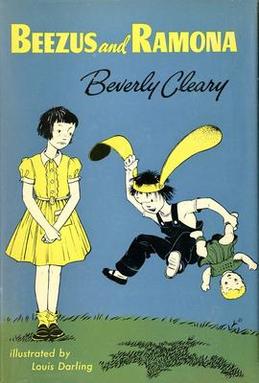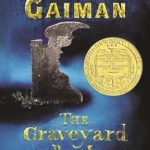Beezus and Ramona is one of my favorite books by Beverly Cleary. First published in 1955, it give the perspective of the the familiar character of Beatrice Quimby (a recurring character in the Henry Huggins books), showing the universal frustrations of having a little sister. Through the course of the book, Beezus comes to understand that it is okay to feel like she does not love her little sister. Sibling relationships are not ever perfect, and Ramona’s antics are sure to try the patience of any big sister!
Each of the six chapters nearly stands alone as a brief story. Specifically, each chapter is told from Beezus’ point of view to show a particular way Ramona “messes up” something for Beezus. For example, first Ramona demands Beezus reads to her and finds a way to keep a library book for ever, much to Beezus’ disgust. Then, Beezus is frustrated by her sister’s creativity and the grown-ups praise for her, when she feels she lacks imagination. Another time Ramona messes up Beezus’ game with her friend Henry and locks Ribsy in the bathroom. A different day, Ramona goes missing and then eats a bite out of each apple while Beezus is the babysitter. And one day, Beezus must scurry to provide Ramona with an impromptu party when all the preschoolers in the neighborhood arrive. Even with the negative feelings that Beezus feels towards her sister, she does find satisfaction as each chapter comes to an end. She finds peace with her own creativity as she paints a picture she is proud of. She tricks her sister so she won’t have to read the same book over and over again. Beezus also finds she can almost laugh at the ridiculousness of the surprise party. Overall, she gets the satisfaction of enjoying the “joke” at Ramona’s expense whenever Ramona is surprised by an outcome.
The last chapter is my favorite and does such an amazing job of tying in all these amusing stories into Beezus’ changing perspective on having a little sister. When Ramona messes up Beezus’ birthday cake, Beezus declares aloud the thought that has pervaded the whole book: she does not love her sister. To her surprise, her mother and aunt can relate. As Beezus learns some of their stories, she delights in the grown-up realization that it’s okay to be frustrated and annoyed at people you truly do love. She is finally able to begin letting go of some of the guilt she’s felt. Although Beezus is only turning ten, there is something so beautifully universal about her growing understanding. Her transition to accepting her sister (or at least accepting that it’s okay to “not love her”) shows a significant growing up moment that will surely feel universal to the young readers as well.
Although the book was written 80 years ago, it feels much more timeless to me than the Henry Huggins books. There aren’t quite as many “gee whillikers” and “golly”s as there are in the other series. Kids may wonder why the Quimby girls are washing their hair in the sink or wonder at a 9-year-old babysitting a preschooler. But otherwise, Beatrice and Ramona Quimby’s first story is full of heart, love, and relatable sibling contention all wrapped up with a birthday bow at the end.





